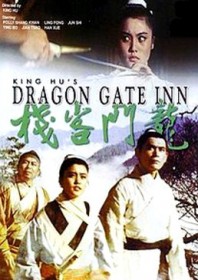
This wonderful wuxia film from auteur director King Hu had the rare distinction – like most of Hu’s work – of being both critically praised and popular with the masses. In Hong Kong, it out-grossed The Sound of Music and helped to make the classical wuxia film acceptable again as a uniquely Chinese cinematic force. Along with Hu’s next work, A Touch of Zen, these films have ultimately become the benchmark by which all future interpreters of the wuxia film are judged; not only in relation to the film’s direct spin-offs – like Tsui Hark’s New Dragon Gate Inn (1992) and Flying Swords of Dragon Gate (2011) – but also commercial hits like Ang Lee’s Crouching Tiger, Hidden Dragon (2000), Zhang Yimou’s Hero (2002) and Hou Hsiao-hsien’s The Assassin (2015).
Hu’s story centralises a much wider historical context into the small confines of a single set; the eponymous Dragon Gate Inn, which is the springboard for all of the action. It’s 1457, around the middle of the Ming Dynasty, and the evil eunuch Cao (Pai Ying) is on the hunt for the remaining descendants of ministerial defector Yu, who has been executed after challenging the all-powerful rule of the Eastern Depot, a eunuch-run Ming dynasty spy agency, also known as the Dong Chang. Yu’s family flee to Dragon Gate Inn where Cao sets up an ambush, led by top royal agents Bi Xiao-tung (Miao Tian) and his right-hand-man, Mao Tsun-hsien (Han Ying-chieh). For a tea-house situated in a desolate expanse in the middle of nowhere, the inn soon gets very crowded. A wandering scholar and fighter called Xiao (Shih Chun) arrives harbouring his own secret motives, catching a flying dagger with his chopsticks when Bi’s men instantly go on the offensive; and a sibling unit of undercover fighters stop by to assist Xiao in planning a counter attack. The inn transforms from a restaurant into a hotel, a hospital, and finally a booby-trapped battle ground as the upper echelons of power become absorbed into its treacherous confines and the carnage escalates.
This is referred to as the second in Hu’s ‘inn trilogy’ – the first being the bloodthirsty Come Drink with Me (1966) which Hu made while still under contract at Shaw Brothers. This is the superior film, owing much to the freedom afforded to Hu following his relocation to Taiwan and away from the limited sets at Shaw Brothers. Hu, channeling his skills as a former art director and costume designer, fills his widescreen lens with breathtaking sunrises and mountainous vistas upon which he positions subjects like chess pieces to add depth to the landscapes. During the action (which flies in thick and fast, particularly in the final third), his camera moves in calculated, fluid motions around his performers, or tracks stealthily towards potential danger in suspenseful echoes of Alfred Hitchcock and Sergio Leone. The action scenes possess a formidable energy which shows Hu as more of a populist director, equally committed to entertaining his audience as well as leaving them beguiled. The music is also worth mentioning, dropping as it does in brash orchestral bursts which seemingly come out of nowhere and really help to disorientate and hike up the tension.
By appropriating themes from both American westerns and film noir into a classical wuxia setting, Hu forged his own cinematic language. His characters are ambiguous and intriguing, if slightly two-dimensional, and set the template for the archetypes of martial arts cinema. There is another cross-dressing female warrior like Golden Swallow from Come Drink with Me in the form of 17 year old debutante Polly Shang Kwan, who is a superior fighter and in no way considered inferior due to her sex. Equally sexless are the eunuch characters; two of which are shown to be honourable victims who join forces with the heroic alliance, and the other is the cape-wearing bureaucratic madman Cao who possesses almost supernatural fighting abilities, bounding across woodland and inflicting internal pain with his qigong strikes. Intriguingly, Hu even gives Cao a weakness – a debilitating asthma – which throws another characteristically sympathetic curve-ball in our direction.
Simply put, this is a must-watch and a lesson in how to create truly captivating cinema.
AKA: Breakthrough; Dragon Inn
- Country: Taiwan
- Action Director: Han Ying-chieh
- Directed by: King Hu Chin-chuan
- Starring: Han Ying-chieh, Miao Tian, Pai Ying, Polly Shang Kwan, Shih Chun, Sit Hon
- Produced by: Cheung Tiu-yin
- Written by: King Hu Chin-chuan
- Studio: Union Film












